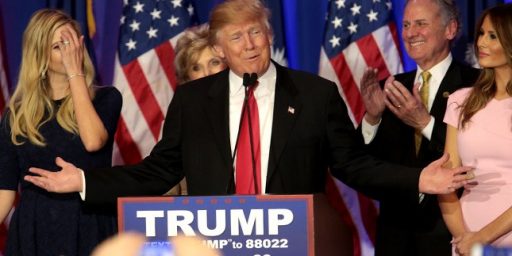More on the Pathologies of the EC
It's the battleground states that are the issue, not small states v. large states.
 Nate Cohn points out (The Electoral College’s Real Problem: It’s Biased Toward the Big Battlegrounds) that the small state/large state focus in discussions of the Electoral College is not the place to focus:
Nate Cohn points out (The Electoral College’s Real Problem: It’s Biased Toward the Big Battlegrounds) that the small state/large state focus in discussions of the Electoral College is not the place to focus:
If there is a benefit to protecting small states, the Electoral College is not doing a great job of providing it. Big states can dominate small ones under the system, and they have done so at times.
The true quirkiness of the Electoral College comes from how states award their votes, not how many votes each state has: It’s (largely) winner-take-all.
This is the feature that defines the character of American presidential elections. A candidate who narrowly wins the tipping-point states will win the presidency, regardless of the margin of victory in the rest of the country. That means there’s no incentive for candidates to campaign in any noncompetitive state, whether it’s a populous one like California or the opposite, like North Dakota.
The winner-take-all bias that elevates the battleground states overruns all of the other biases.
[…]
What’s so interesting is that this defining feature is largely unintended.
It’s not specified in the Constitution.
Beyond that, Republicans like to defend the EC because of some alleged protection of the rest of the country from big states like CA and NY (although they never complain about Texas…):
They argue that Democrats won the popular vote because of their big margin in California, and that the Electoral College properly protected the rest of the country against an imperial California or New York.
But that is not what happened. Mr. Trump’s victory in the Electoral College was mainly because of impressive strength in the traditional battlegrounds, not lopsided and inefficient Democratic strength in their regional bastions. Indeed, Mr. Trump did just as well in his base states — call them Appalachafornia — as Mrs. Clinton did in California.
Mr. Trump’s electoral victory was a product of two factors. One was essentially an accident of state lines. The 2016 results could be flipped just by giving the Florida Panhandle to Alabama and the Upper Peninsula of Michigan to Wisconsin. It’s not clear that there was anything about the distribution of Mrs. Clinton’s support that inevitably put it at a disadvantage in a winner-take-all system.
The second is that the traditional battlegrounds are whiter and less educated than the country as a whole. Mrs. Clinton’s gains came in well-educated and diverse states that tend to be less competitive, including red states like Arizona, Texas and Utah.
Ultimately, it is about which states are competitive, not their size nor which region they are in:
even if the Electoral College is supposed to discourage regionalism, it can do little to erode it once it takes hold, since it offers no incentive for a candidate to appeal to a place he or she can’t win. In fact, there is no reason that Mr. Trump, who has complained about how he did in California, needs to put his name on the ballot there at all.
Emphases mine.
Let that sink in: Trump could not have been on the ballot in our most populated state, and still would have won the presidency. How can they possibly be reflective of a democratic system of election? This fact means, really, that the millions of Republican voters in CA don’t matter to the outcome. Indeed, by this logic we could only hold competitive elections (with multiple competitors on the ballot) in battleground states and those which have a lean. We could just run one-candidate races in states with an unassailable partisan majority one way or the other (such as the state in which I reside, Alabama) and concentrate just on those that have a chance of competitiveness (which is pretty much what the campaigns do anyway). You know, just like the Framers intended.
So, we have a system in which not all votes are equal and one in which many state elections are largely irrelevant. Again, I am at a loss for a defense of this system.






States are also a lot less important now than they were before the Civil War and the 14th Amendment which has been used to make the Bill of Rights apply to the states.
When people say that the Civil War was fought over State’s Rights, rather than slavery they are half right — it was the State’s Rights involving Slavery, and the States lost. Bigly.
There may have been a value in States having a vote for the presidency, rather than the People, in 1800, but in 2019 that just isn’t the case. After the Civil War, we went from a Republic to a Democracy*.
As a counter-example, the UN doesn’t use any form of proportional representation or democracy of the governed in the Security Council. The Countries are the main actors there.
*: yes, that phrasing was deliberately meant to trigger Steven Taylor. I am a troll at heart.
This is what I was trying to get at in the other thread a few days ago: contrary to the oft-heard claim that the EC intrinsically benefits Republicans today because of their strength in smaller, more rural states, in fact any benefit the EC gives to a party is ephemeral and tends to shift from one election to the next. In 2012, the EC benefited Dems more because their votes were more efficiently distributed in the states needed for an EC victory.
As an article from 538 noted a couple of weeks ago: “Even if these states don’t shift around that much relative to the country overall, they shift around enough to change which party has an Electoral College advantage. For example, in 2016, President Trump’s appeal in states like Michigan, Pennsylvania and Wisconsin caused them to shift just a few points more Republican. It just so happens that that small shift was enough to push them from being more Democratic than the nation to more Republican, which meant the Electoral College gave Republicans a disproportionate advantage in 2016, even though it had given Democrats a disproportionate advantage in 2012. Indeed, the party that has benefited from the Electoral College has bounced around from election to election, seemingly at random.”
Bottom line: People vote, not states…so the votes of the people should decide who wins the presidency…
The EC bothers me, for sure. What bothers me even more is the disconnect between votes and representation in the House. That’s just not supposed to happen. No Founder meant for that to happen, nobody makes that argument. Discussion of the EC is kind of a distraction.
I guess the point is that nobody really feels there’s anything they can do about it. I think increasing the size of the House would do it just fine, and probably address certain EC inequities while at it. I’m pretty sure you wrote about this a while back, even.
Meanwhile the difference in populations between largest and smallest state is on the order of 80x, and could hit 100x in a decade or two. Nobody who wrote the Constitution ever imagined that happening.
My weird thought of the day is that Wyoming could probably have it’s political identity rewritten completely if say, 50K dedicated Democratic couples retired there and made it their place of voting. I think it would produce a big swing, and quite an outrage.
@Jay L Gischer: Representativeness, in general, is a problem in our system.
And yes, absolutely, the House is under-sized.